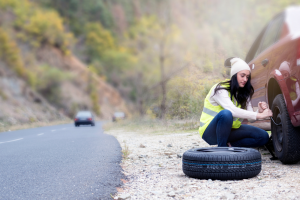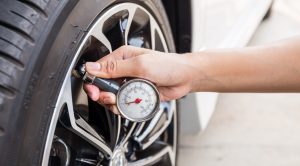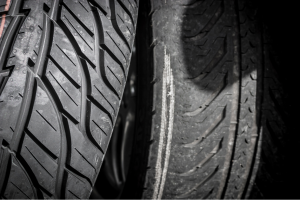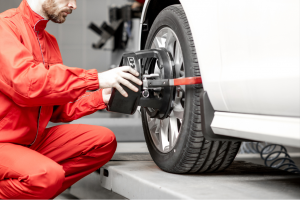5 Things You’re Doing That Shorten Your Car’s Tire Life

Avoiding common tire care mistakes can prevent breakdowns and keep you safe on the road.
Your tires are one of the most critical components of your vehicle, yet they’re often overlooked until something goes wrong. Proper tire care not only enhances your safety but also saves money by extending their lifespan. However, many drivers unknowingly engage in habits that lead to premature tire wear. Here are five things you might be doing that are actually shortening your car’s tire life.
1. Driving with Incorrect Tire Pressure

Checking tire pressure regularly is key to maintaining tire health and improving fuel efficiency.
One of the easiest ways to extend tire life is by maintaining the correct tire pressure. Whether under-inflated or over-inflated, tires wear unevenly when they aren’t properly inflated, resulting in premature tire wear.
- Under-inflated tires: This increases the surface area of the tire in contact with the road, leading to quicker wear on the outer edges. It also reduces fuel efficiency, meaning your car consumes more gas.
- Over-inflated tires: These tend to wear faster in the center of the tread, leading to uneven tread wear and a shortened lifespan.
Regular tire pressure checks can prevent this, especially since tire pressure changes with temperature fluctuations. Read more here: Understanding Tire Pressure.
2. Skipping Regular Tire Rotations

A striking contrast: New tire vs. old tire. Proper maintenance can make all the difference.
Not rotating your tires regularly is another surefire way to reduce tire lifespan. The front and rear tires wear at different rates due to steering and braking, especially in front-wheel-drive vehicles.
By keeping a regular tire rotation schedule (every 5,000 to 8,000 miles), you ensure that your tires wear evenly, thus extending tire life. Uneven tread wear can also compromise safety, especially in wet or icy conditions. Book an appointment here.
3. Neglecting Wheel Alignment

Tire alignment is crucial for preventing uneven tread wear and ensuring smooth, safe driving.
Wheel alignment plays a crucial role in maintaining proper tire wear. When your car’s wheels are misaligned, it causes uneven tread wear, and over time, can lead to a complete loss of control during driving.
Signs that you need an alignment service include your vehicle pulling to one side or steering issues. Regular wheel alignment checks will help prevent uneven tire wear and keep your tires performing at their best. Book an appointment here.
4. Hard Braking and Aggressive Driving

Aggressive driving habits can increase tire wear and reduce safety on the road.
Frequent hard braking, rapid acceleration, and aggressive cornering put a lot of stress on your tires. These habits can cause excessive heat buildup, leading to tire tread wear and even tire blowouts.
By adopting smoother driving habits, you can preserve the integrity of your tires. Related: How to Drive Safely This Holiday Season
5. Overloading Your Vehicle

Overloading your car can lead to bulging tires and unsafe driving conditions.
Every tire has a maximum load capacity, which is often listed on the tire sidewall or in the owner’s manual. Consistently overloading your vehicle not only reduces fuel efficiency but can also lead to tire blowouts, especially at high speeds. Read more here: Tire Load Indexes and Speeds: What You Need to Know
This habit puts extra stress on the tire’s sidewalls and causes them to wear out faster. Always make sure your load is within the tire’s specifications to avoid premature tire wear.
Conclusion
Taking care of your tires goes beyond simple checkups. Addressing driving habits like proper tire pressure, regular tire rotations, ensuring wheel alignment, and avoiding overloading can significantly extend tire life and improve your overall vehicle safety. Implement these practices and you’ll not only maximize your tires’ lifespan but also save money in the long run.
Remember: your tires are the only thing between your car and the road, so investing in their care is critical to your safety.
